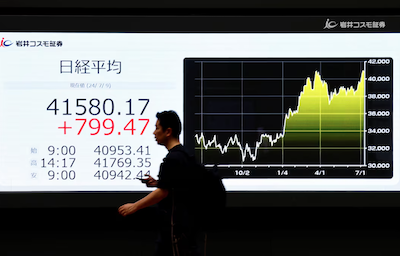Asia’s major markets continued their inconsistent week on Thursday with investors heading in different directions, reacting to threats of an escalation in the US-China tech war or betting on Beijing rolling out more stimulus measures.
A report that the United States was considering tighter curbs on exports of advanced semiconductor technology to China triggered a sharp sell-off in chip stocks, with the Nasdaq tumbling overnight.
That, along with the shortened odds on Donald Trump’s return to office after Saturday’s failed assassination attempt and the likelihood of a more belligerent Washington in its trade dealings with China, also piled the pressure on tech stocks.
Also on AF: China Solar Firms Are Taking Over US And No One Can Stop Them
Japan’s Nikkei share average tumbled more than 2%, as chip-related stocks joined the global sell-off in the sector, while a strengthening yen weighed on automakers and other exporters.
Remarks from Republican presidential nominee Trump saying key production hub Taiwan should pay the United States for its defence then deepened the rout.
The Nikkei closed 2.36% lower at 40,126.35, after falling earlier in the day to 40,104.22 – its lowest since July 2. A week earlier, it had jumped to a record high of 42,426.77. The broader Topix was down 1.60%, or 46.58 points, to 2,868.63.
Chip-making-equipment giant Tokyo Electron was the biggest drag on the Nikkei, slumping 8.75%.
China stocks, however, edged up as investors awaited policy news from a key leadership meeting in Beijing, though trade tensions with the US ensured the gains were modest.
Investors are pinning their hopes on the four-day plenum to reinvigorate the economy, particularly after the second-quarter GDP failed to meet forecasts due to a prolonged downturn in the property sector and job concerns.
The CSI 300 Index edged up 0.55%, while the Shanghai Composite Index rose 0.48%, or 14.28 points, to 2,977.13. The Shenzhen Composite Index on China’s second exchange was ahead 0.33%, or 5.30 points, to 1,604.59.
US Dollar Close to Four-Month Low
Hong Kong’s Hang Seng Index edged up 0.22%, or 39.00 points, to 17,778.41, with traders there also betting on policy announcements to turn the world’s No2 economy around coming out of Beijing this week.
Elsewhere across the region, in earlier trade, Taipei fell more than 1% while there were also losses in Sydney, Seoul and Singapore. However, Mumbai, Wellington, Manila, Mumbai, Bangkok and Jakarta all rose.
MSCI’s broadest index of Asia-Pacific shares outside Japan fell 0.63%, with a sub-index of IT stocks down 2.5%.
European bourses were due for a mixed open, with Eurostoxx 50 futures 0.14% lower while German DAX futures were little changed and FTSE futures edged up 0.5%.
Investor attention will be on the policy decision from the European Central Bank later in the day, where the central bank is expected to stand pat, although comments from officials will be crucial in gauging when the next rate cut will come.
The US dollar loitered close to its weakest in four months against a basket of currencies as comments from Federal Reserve officials bolstered the case for a cut in September, keeping gold near record highs.
Gold, Oil Rise
The dollar index, which measures the US currency versus six peers, was 0.1% higher at 103.78, not far from the four-month low of 103.64 it touched on Wednesday.
The yen hit a six-week high against the dollar at 155.375 in early trading after a sharp rise on Wednesday that had traders suspecting Japanese authorities were once again in the market supporting the currency. It was last at 156.
Bank of Japan data suggested Tokyo may have bought nearly 6 trillion yen last week to lift the frail yen away from the 38-year lows it has been rooted to since the start of the month.
The yen has dropped 9.5% against the dollar this year as the wide interest rate difference between the US and Japan weighs.
In commodities, gold was 0.34% higher at $2,466.62 per ounce just below the record high of $2,483.60 it touched on Wednesday.
Oil prices were on the rise, with Brent futures 0.4% higher at $85.45 a barrel, while US West Texas Intermediate (WTI) crude gained 0.7% to $83.43.
Key figures
Tokyo – Nikkei 225 < DOWN 2.36% at 40,126.35 (close)
Hong Kong – Hang Seng Index > UP 0.22% at 17,778.41 (close)
Shanghai – Composite > UP 0.48% at 2,977.13 (close)
London – FTSE 100 > UP 0.74% at 8,247.80 (0935 BST)
New York – Dow > UP 0.59% at 41,198.08 (Wednesday close)
- Reuters with additional editing by Sean O’Meara
Read more:
‘Garbage Time’ – China’s New Expression of Economic Despair
Key EV Software Must be Made in an Allied Nation: US Official
TSMC Shares Fall on Trump Remark ‘Taiwan Should Pay for Defence’
Nikkei Dips on Profit-Taking, Trump Worries Drag on China Stocks























